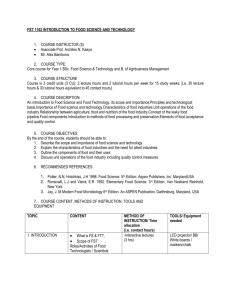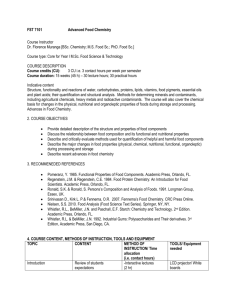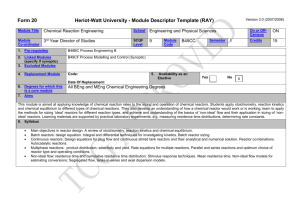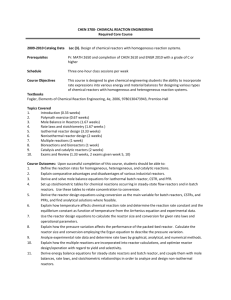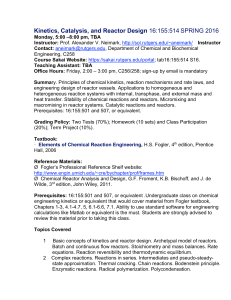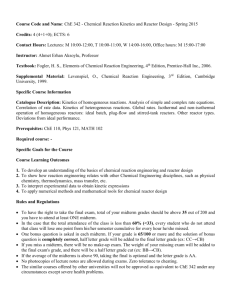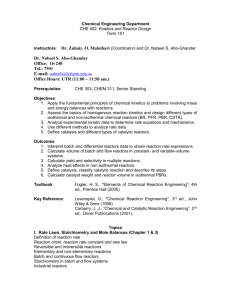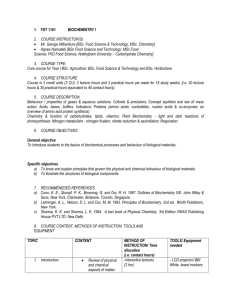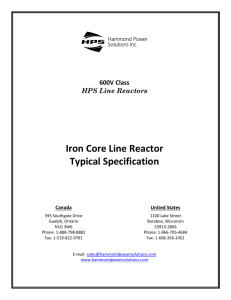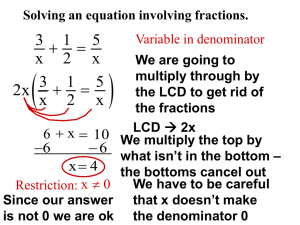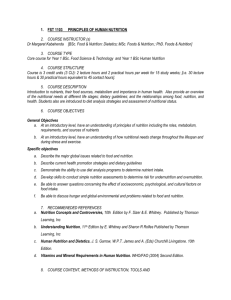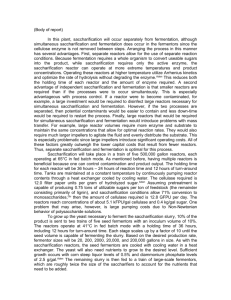FST 7201 FOOD PROCESSING ENGINEERING
advertisement
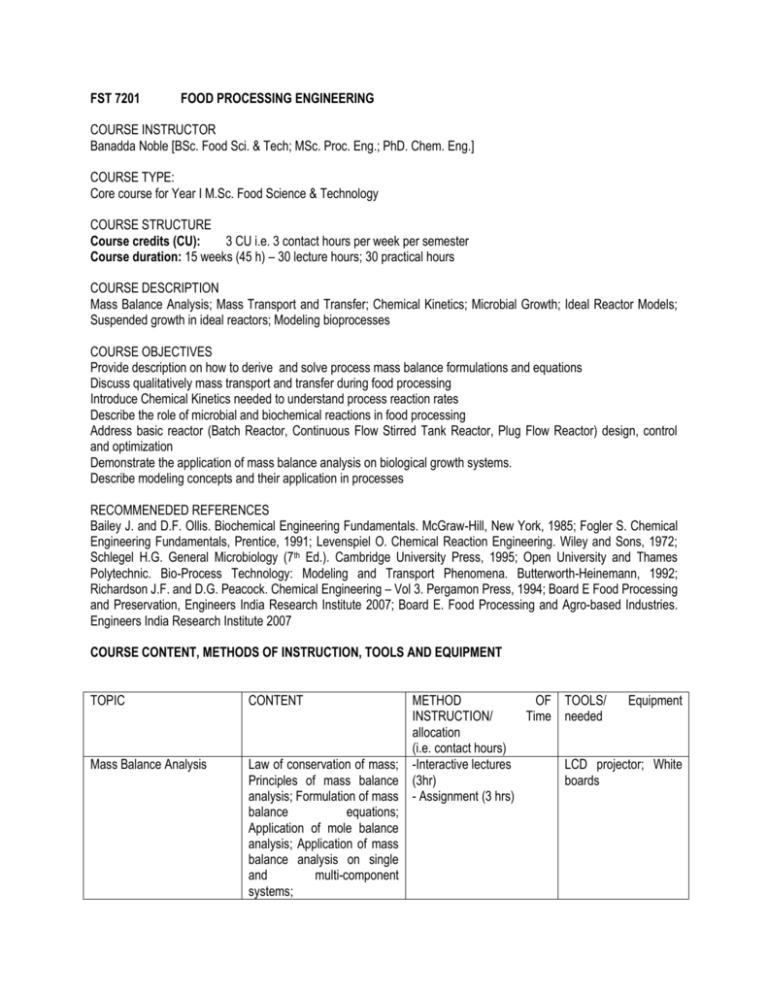
FST 7201 FOOD PROCESSING ENGINEERING COURSE INSTRUCTOR Banadda Noble [BSc. Food Sci. & Tech; MSc. Proc. Eng.; PhD. Chem. Eng.] COURSE TYPE: Core course for Year I M.Sc. Food Science & Technology COURSE STRUCTURE Course credits (CU): 3 CU i.e. 3 contact hours per week per semester Course duration: 15 weeks (45 h) – 30 lecture hours; 30 practical hours COURSE DESCRIPTION Mass Balance Analysis; Mass Transport and Transfer; Chemical Kinetics; Microbial Growth; Ideal Reactor Models; Suspended growth in ideal reactors; Modeling bioprocesses COURSE OBJECTIVES Provide description on how to derive and solve process mass balance formulations and equations Discuss qualitatively mass transport and transfer during food processing Introduce Chemical Kinetics needed to understand process reaction rates Describe the role of microbial and biochemical reactions in food processing Address basic reactor (Batch Reactor, Continuous Flow Stirred Tank Reactor, Plug Flow Reactor) design, control and optimization Demonstrate the application of mass balance analysis on biological growth systems. Describe modeling concepts and their application in processes RECOMMENEDED REFERENCES Bailey J. and D.F. Ollis. Biochemical Engineering Fundamentals. McGraw-Hill, New York, 1985; Fogler S. Chemical Engineering Fundamentals, Prentice, 1991; Levenspiel O. Chemical Reaction Engineering. Wiley and Sons, 1972; Schlegel H.G. General Microbiology (7th Ed.). Cambridge University Press, 1995; Open University and Thames Polytechnic. Bio-Process Technology: Modeling and Transport Phenomena. Butterworth-Heinemann, 1992; Richardson J.F. and D.G. Peacock. Chemical Engineering – Vol 3. Pergamon Press, 1994; Board E Food Processing and Preservation, Engineers India Research Institute 2007; Board E. Food Processing and Agro-based Industries. Engineers India Research Institute 2007 COURSE CONTENT, METHODS OF INSTRUCTION, TOOLS AND EQUIPMENT TOPIC Mass Balance Analysis CONTENT METHOD OF TOOLS/ Equipment INSTRUCTION/ Time needed allocation (i.e. contact hours) Law of conservation of mass; -Interactive lectures LCD projector; White Principles of mass balance (3hr) boards analysis; Formulation of mass - Assignment (3 hrs) balance equations; Application of mole balance analysis; Application of mass balance analysis on single and multi-component systems; Mass Transport Transfer and Convective mass transport; molecular transport (dispersion); Micro mass balance equations; Mass transfer between phases; Gas-liquid mass transfer LCD projector; White boards; Library; transport to fruit drying - Practicals on drying of facility ; packaging fruits and vegetables (8 hours) -Self study Chemical Kinetics Comparison Equilibrium -Interactive lectures LCD projector; White thermodynamics; Chemical (6 hrs) boards; Library Kinetics, Equilibrium Thermodynamics, Chemical - Self study Kinetics, Rate Equations Microbial Growth Role of Enzymes, - Interactive lecture LCD projector; White Stoichiometric aspects, (4 hrs) boards; Library Microbial Growth, Product -Self study Formulation; optimality in - Assignment (3 hours); enzymatic controlled processes Ideal Reactor Models Batch Reactors, Continuous -Interactive lectures - LCD projector; White Flow Stirred Tank Reactors, (6 hrs) boards; Library; Pilot Plug Flow Reactors and Food Processing Practicals plant processing Conversion in Ideal Reactors, (8 hours); packaging , Maximizing substrate removal and biomass production; Reactor design - Self study and Control; Process Optimization Suspended growth in ideal Process control of suspended - Interactive lecture LCD projector; White reactors growth in Batch Reactors, (3 hrs) boards; Library Continuous Flow Stirred Tank -Self study Reactors, and Plug Flow Reactors Mid Semester test Modeling bioprocesses Model identification; model -Interactive lectures LCD projector; White fitting, model overfitting and (2 hr) boards; pilot plant under fitting; model - Self study processing validation; optimization Food Processing criteria; model application in Practicals (8 hours); processes with recycle packaging operations Final Exam SUMMARY OF T IME NEEDED Lecture hours Practicals 30 hr 30 hr OVERALL COURSE EVALUATION Assignments 15% Practicals, class attendance and participation 10% -Interactive lectures (6 hrs) Course tests Final exam 15% 60%
